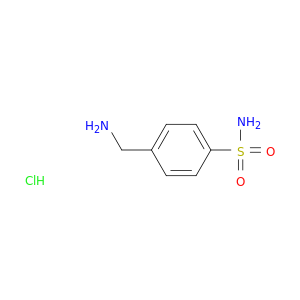
4-Aminomethylbenzenesulfonamide, HCl
| Title | Journal |
|---|---|
| Silver debate continue. | Journal of wound care 20110601 |
| Comparison between topical honey and mafenide acetate in treatment of auricular burn. | American journal of otolaryngology 20110101 |
| Synthesis and SAR studies of 1,4-benzoxazine MenB inhibitors: novel antibacterial agents against Mycobacterium tuberculosis. | Bioorganic & medicinal chemistry letters 20101101 |
| Systemic absorption of amphotericin B with topical 5% mafenide acetate/amphotericin B solution for grafted burn wounds: is it clinically relevant? | Burns : journal of the International Society for Burn Injuries 20100201 |
| The diversity of wound presentation associated with freon contact frostbite injury. | Journal of burn care & research : official publication of the American Burn Association 20100101 |
| Understanding and managing burn pain: Part 2. | The American journal of nursing 20090501 |
| Highly antibiotic-resistant Acinetobacter baumannii clinical isolates are killed by the green tea polyphenol (-)-epigallocatechin-3-gallate (EGCG). | Clinical microbiology and infection : the official publication of the European Society of Clinical Microbiology and Infectious Diseases 20090401 |
| Comparison of therapeutic antibiotic treatments on tissue-engineered human skin substitutes. | Tissue engineering. Part A 20080501 |
| Effects of commonly used topical antimicrobial agents on Acinetobacter baumannii: an in vitro study. | Military medicine 20080101 |
| Allergic contact dermatitis to mafenide acetate: a case series and review of the literature. | Journal of drugs in dermatology : JDD 20070801 |
| Comparative evaluation of silver-containing antimicrobial dressings and drugs. | International wound journal 20070601 |
| Management of bioburden with a burn gel that targets nociceptors. | Journal of wound care 20070401 |
| Seven years' experience with Integra as a reconstructive tool. | Journal of burn care & research : official publication of the American Burn Association 20070101 |
| Controlling methicillin resistant Staphyloccocus aureus and Pseudomonas aeruginosa wound infections with a novel biomaterial. | Journal of investigative surgery : the official journal of the Academy of Surgical Research 20070101 |
| Managing extracavitary prosthetic vascular graft infections: a pathway to success. | Annals of plastic surgery 20061201 |
| Vibrational analyses of sulfamoyl halides NH2SO2X (X is F, Cl and Br). | Spectrochimica acta. Part A, Molecular and biomolecular spectroscopy 20061001 |
| Microsphere-based protease assays and screening application for lethal factor and factor Xa. | Cytometry. Part A : the journal of the International Society for Analytical Cytology 20060501 |
| Topical Sulfamylon cream inhibits DNA and protein synthesis in the skin donor site wound. | Surgery 20060501 |
| Adjuvant dressing for negative pressure wound therapy in burns. | Ostomy/wound management 20060101 |
| Methylamine but not mafenide mimics insulin-like activity of the semicarbazide-sensitive amine oxidase-substrate benzylamine on glucose tolerance and on human adipocyte metabolism. | Pharmacological research 20051201 |
| Survival benefit conferred by topical antimicrobial preparations in burn patients: a historical perspective. | The Journal of trauma 20040401 |
| Comparative evaluation of topical antiseptic/antimicrobial treatment on aspects of wound repair in the porcine model. | Ostomy/wound management 20020901 |
| Using mafenide acetate in acute and chronic wounds. | Ostomy/wound management 20020901 |
| Dressings for burn injury in a military conflict--change of practice based on current evidence. | Journal of the Royal Army Medical Corps 20020901 |
| Mafenide acetate allergy presenting as recurrent chondritis. | Annals of plastic surgery 20020201 |
| Off-label drug use in WOC nursing: issues related to use of mafenide acetate to treat infected chronic wounds. | Journal of wound, ostomy, and continence nursing : official publication of The Wound, Ostomy and Continence Nurses Society 20010901 |
| An in vivo comparison of topical agents on wound repair. | Plastic and reconstructive surgery 20010901 |
| The use of 5% mafenide acetate solution in the postgraft treatment of necrotizing fasciitis. | The Journal of burn care & rehabilitation 20010101 |
| Does the addition of nystatin to 5% mafenide acetate and genitourinary irrigant solutions interfere with their antimicrobial activity? Assessment by two topical antimicrobial test assay systems. | The Journal of burn care & rehabilitation 20010101 |
| Topical mafenide hydrochloride aqueous spray in initial management of massive contaminated wounds with devitalized tissue. | Prehospital and disaster medicine 20010101 |